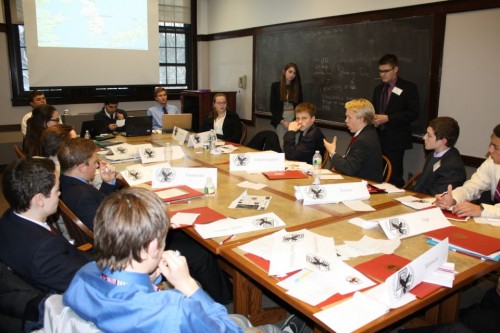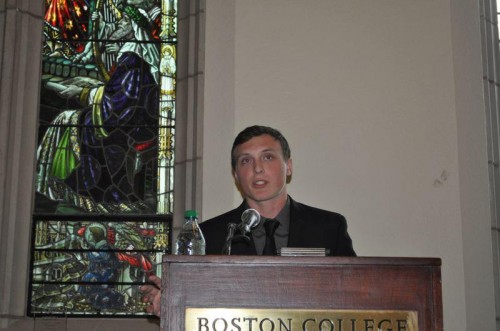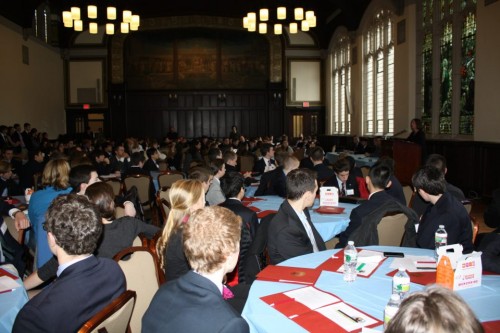Article Submitted by: Braeden Lord, Secretary General of EagleMUNC II

Model UN is unlike any other type of debate. The “Crisis Simulation” of a Model UN Conference turns students into Presidents, Diplomats, and CEOs for a weekend. Model UN however, has failed to replicate the real geopolitical world.
The world’s smoke-filled rooms are measured by budgets, technology, public affairs, and most importantly, consequences. However, Model UN remains measured by unrealistic diplomacy (e.g. Iran and Israel co-sponsoring a resolution) archaic communication lines, and infinite resources. In announcing an innovative “40-Hour Simulation,” Boston College’s EagleMUNC has committed to creating a perpetual and immersive Crisis Simulation, wrought with all of the realpolitik that diplomats face 24/7, 365.
EagleMUNC seeks to address the questions of Who, What, When, Where, and How Model UN might achieve realism:
1. How: A Modern Crisis Infrastructure
Model UN communications remain plagued by scrap paper, lag time, and guestimates. “Billions” of dollars are allocated on post-it notes, and Crisis sifts through mountains of torn legal pads, searching hectically for a sloppily-written order to develop nuclear warheads. This is not realism:
At EagleMUNC, each delegate will be issued position emails, social media accounts, and “PO Boxes.” This streamlined and paperless infrastructure will not only make communication seamlessly instant, but will break the mold of “herding” delegates into unwieldy, inactive committees. Reinventing the elbow grease behind Model UN Crises will enable EagleMUNC to create a fast-paced and nuanced delegate experience.
2. Who: Dynamic Interactions with EVERYONE…
No ambassador, operative, or advisor lives a life in the vacuum of his committee peers. Real politicians balance the competing motives of their donors, advisors, allies, and foes. Why should Model UN delegates work in blissful ignorance of the thousands of politicians working for, with, and against them? They shouldn’t:
Each “Confidential Brief” that EagleMUNC delegates will receive contains a rolodex of all the journalists, lobbyists, family members, and influential individuals to which he or she is accountable. For example in the delegate life of Senator Saxby Chambliss, a member of the Senate Committees of Intelligence and Agriculture, he will be confronted with email addresses from his wife, fellow Congressmen, lobbyists at the American Farm Bureau Association, and intelligence operatives at home and abroad. For 40-Hours he will be pushed and pulled through a melee of meetings and communiqués with these people, forced to weigh the consequences of his every move.
3. What: Finite Resources
One cannot simply resolve a drought by “allocating funds for pipeline infrastructure and desalinization projects.” Money, militaries, and medicine do not materialize from thin air. Diplomats face budgets, time restrictions, and externalities. Delegates, however, still solve conflicts by instantaneously wiring billions of dollars and deploying thousands of troops. The world is not so simple:
An EagleMUNC delegate’s “Confidential Brief,” will contain a summary of the resources at his or her discretion. King Alfonso I of Portugal (Second Crusade, JCC) will know the military capacity of his Crusaders, the stock of gold in Lisbon’s Treasury, and the waypoints of his navy. With shrewd management, delegates will seal a glorious fate. Conversely, with shortsightedness, greed, and misjudgment, power will turn to sand through their fingertips.
4. When: Perpetuity
In a typical Model UN committee, delegates emerge from structured committee sessions, having nearly altered global politics, and are reminded that they are 14 years old. Over the course of 48-hours, the average delegate is lucky to experience a crisis for a highly-interrupted 12-hours. But politics never sleeps:
EagleMUNC’s 40-Hour Simulation will confront delegates with the perpetuity of power and influence. Delegates will face communiqués, emergency meetings, and crises throughout the conference. A perpetual communication model will shatter the notions of “committee sessions” and “midnight crises,” and launch a true-to-life experience of political existence.
5. Where: Diverse Committee Formats
As conventional Model UN holds, a US Senator would serve in the Senate Committee 6 times, for 2-3 hours each, over the course of 3 days. This traditional single-committee format fails to simulate the diverse, dynamic, and most importantly, unpredictable life of a politician.
At EagleMUNC, Senator Saxby Chambliss will not merely be a Senator on the floor. For 40-Hours, his “committee” time will be spent meeting with the Tea Party, the RNC, the Committee on Intelligence, and his constituents. His online schedule will guide him through press conferences, diplomatic trips, and clandestine meetings. Every delegate will face an array of formats tailored to their position, challenging the notions of large committees, small committees, and “your committee.”
…Why is EagleMUNC doing this? On the circuit we believe that a hands-on education is what makes delegates stand out as college applicants, pre-professionals, and young adults. An experience in managing resources, weighing interests, and realizing consequences is invaluable to a young generation of problem solvers, and may revolutionize Model UN as an educational medium. EagleMUNC delegates will have 40-Hours to change the world, and the clock is ticking…
More information can be found on: http://www.eaglemunc.org/
Here are some photos of the first EagleMUNC conference along with conference leaders and the EagleMUNC logo:




